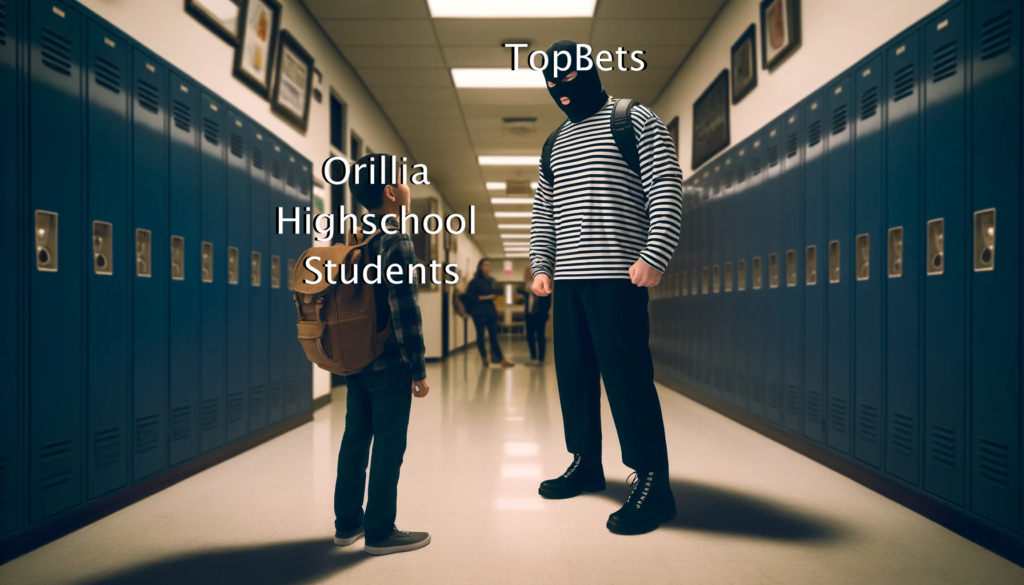In this week’s GME3 we’re examining an illegal gambling ring targetting high school students in Ontario, a new law in Spain that would create a dedicated framework to regulate the content of social media influencers, and a new update in the TikTok ban saga. Read the full stories below!
Gambling
Topbets Bottoms Out
The Ontario Provincial Police are investigating reports of an illegal online gambling site targetting high school students in the city of Orillia, Ontario. Some students have reported that they have been receiving threats over money they owe after using the platform.
Through this website, known as Topbets, underaged students were allowed to place bets on sporting events and play casino-style games for real money. While the investigation is still in the early stages, police have arrested one person under the age of 18 who has been charged with two counts of uttering threats to cause death in relation to the matter. Police are still investigating the means by which bets were placed and how payments were placed into the system or paid out.
The most mysterious part of this story to us is that whoever set up this website thought they could get away with it. Gambling, especially in Ontario, is one of the most highly regulated activities in the world. Obtaining a legitimate license with iGO and the AGCO takes a considerable amount of time and effort, and even once you’ve gotten that far, there are numerous standards operators must stay in compliance with. This includes KYC procedures, anti-money laundering standards, responsible gambling initiatives, and more.
We can see from this example why all of those steps are so important – real gaming platforms don’t want high school students as customers and have to take steps to ensure that their users are all allowed to be there. Furthermore, Meredith Fryia, a representative from the Addiction Program at the Canadian Mental Health Association, has argued that problem gambling is a rising issue among Canadian youth. As such, it’s easy to see why this website got shut down so quickly.
If you have questions about how to obtain a gaming license in Ontario, or the responsibilities that come along with operating a gambling site in compliance with Candian laws, reach out to us here at GME Law!
Media
No (S)pain, No Gain
Spain is taking steps to become the first country in Europe to adopt a dedicated framework to regulate the content, standards, and advertising practices of social media influencers.
Revealed last Friday, the New General Law on Audiovisual Communication (LGCA) will determine the legal rights of content creators, vloggers, and influencers engaging Spanish audiences on social media platforms. The goals of the LGCA are, among other things, to protect the intellectual property of content creators, safeguard minors from viewing adult content, and apply specific rights on social media platforms.
The LGCA will also establish new rules for any creators who have generated an income of over €300,000 from their online content. Some of these include disclosing any activity that they derive economic income from and assuming ‘editorial responsibility’ for content displayed on their channels.
More interestingly (from our perspective as a gaming firm) is that the LGCA states that content creators must observe the laws of Spain’s Royal Decree on Advertising. This would mean that all forms of gambling advertising on social media platforms would be restricted between the hours of 1 and 5 AM and Spanish audiences are to be excluded from the marketing of any “gambling incentives.
Jdigital, Spain’s online gambling trade association attempted to appeal the new law based on the argument that the government had overlooked key constitutional procedures in implementing federal laws. However, the Spanish government seems determined to enact this framework.
And they won’t stop there! Pablo Bustinduy, Spain’s new Minister of Social Rights and Consumer Affairs, has warned media platforms to maintain the Royal Decree’s restrictions on gambling advertising despite the challenge from Jdigital. He also alluded to future plans, including more oversight on online platforms and prohibiting the promotion of loot boxes.
Entertainment
Byte Me!
TikTok, and its parent company, ByteDance, have launched a lawsuit to challenge the recently passed U.S. law that would ban the popular video-sharing app across the country unless it’s sold to an approved buyer. ByteDance argues that the law unfairly singles out the company while also being an untenable attack on free speech.
Specifically, the suit claims that the new law vaguely paints ByteDance’s ownership of TikTok as a national security risk in order to get around the First Amendment, despite no evidence that the company poses a threat. ByteDance goes on to state that:
“For the first time in history, Congress has enacted a law that subjects a single, named speech platform to a permanent, nationwide ban, and bars every American from participating in a unique online community with more than 1 billion people worldwide.”
The calls for TikTok to be sold to an American (or at least American-friendly) company may not even be feasible. For one, even if ByteDance wanted to sell TikTok, the company would need approval from the Chinese government. And they have made it clear that ByteDance will not be permitted to sell the algorithm that populates users’ feeds with content, which has arguably had a major impact on the app’s popularity in the United States and elsewhere.
As such, ByteDance has taken the position that, if the law is allowed to continue, they will have no choice but to shut down their American operations by the deadline. They are also unwilling to separate the U.S. TikTok platform as a different entity. If ByteDance fails to be granted an injunction against the new law, it will likely be forced to shut down or sell by the time a broader court case is resolved.
GME Law is Jack Tadman, Zack Pearlstein, Lindsay Anderson, Daniel Trujillo, and Will Sarwer-Foner Androsoff. Jack’s practice has focused exclusively on gaming law since he was an articling student in 2010, acting for the usual players in the gaming and quasi-gaming space. Zack joined Jack in September 2022. In addition to collaborating with Jack, and with a keen interest in privacy law, Zack brings a practice focused on issues unique to social media, influencer marketing, and video gaming. Lindsay is the most recent addition to the team, bringing her experience as a negotiator and contracts attorney, specializing in commercial technology, SaaS services, and data privacy.
At our firm, we are enthusiastic about aiding players in the gaming space, including sports leagues, media companies, advertisers, and more. Our specialized knowledge in these industries allows us to provide tailored solutions to our clients’ unique legal needs. Reach out to us HERE or contact Jack directly at jack@gmelawyers.com if you want to learn more!
Check out some of our previous editions of the GME3 HERE and HERE, and be sure to follow us on LinkedIn to be notified of new posts, keep up to date with industry news, and more!




